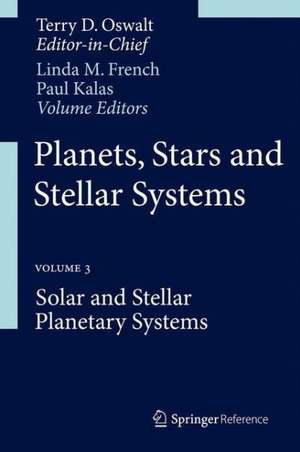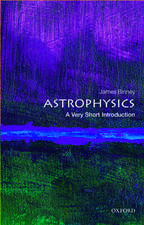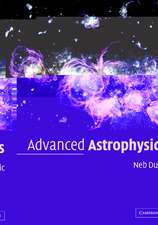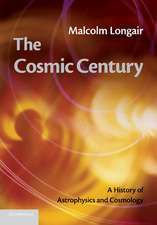Planets, Stars and Stellar Systems: Volume 3: Solar and Stellar Planetary Systems
Terry D. Oswalt Editat de Linda M. French, Paul Kalasen Limba Engleză Hardback – 27 feb 2013
All chapters of the handbook were written by practicing professionals. They include sufficient background material and references to the current literature to allow readers to learn enough about a specialty within astronomy, astrophysics and cosmology to get started on their own practical research projects. In the spirit of the series Stars and Stellar Systems published by Chicago University Press in the 1960s and 1970s, each chapter of Planets, Stars and Stellar Systems can stand on its own as a fundamental review of its respective sub-discipline, and each volume can be used as a textbook or recommended reference work for advanced undergraduate or postgraduate courses. Advanced students and professional astronomers in their roles as both lecturers and researchers will welcome Planets, Stars and Stellar Systems as a comprehensive and pedagogical reference work on astronomy, astrophysics and cosmology.
Preț: 2578.81 lei
Preț vechi: 3393.17 lei
-24% Nou
Puncte Express: 3868
Preț estimativ în valută:
493.44€ • 515.20$ • 408.40£
493.44€ • 515.20$ • 408.40£
Carte tipărită la comandă
Livrare economică 01-07 aprilie
Preluare comenzi: 021 569.72.76
Specificații
ISBN-13: 9789400756052
ISBN-10: 9400756054
Pagini: 564
Ilustrații: XVI, 545 p. 238 illus., 132 illus. in color.
Dimensiuni: 155 x 235 x 36 mm
Greutate: 0.93 kg
Ediția:2013
Editura: SPRINGER NETHERLANDS
Colecția Springer
Locul publicării:Dordrecht, Netherlands
ISBN-10: 9400756054
Pagini: 564
Ilustrații: XVI, 545 p. 238 illus., 132 illus. in color.
Dimensiuni: 155 x 235 x 36 mm
Greutate: 0.93 kg
Ediția:2013
Editura: SPRINGER NETHERLANDS
Colecția Springer
Locul publicării:Dordrecht, Netherlands
Public țintă
Professional/practitionerCuprins
1.From Disks to Planets. 2. Dynamical evolution of planetary systems. 3.The Terrestrial Planets.4. Gas and Ice Giant Interiors. 5. Atmospheres of Jovian Planets. 6.Planetary Magnetosphere. 7.Planetary Rings. 8.An Overview of the Asteroids and Meteorites. 9. Dusty Planetary Systems. 10. Exoplanet Detection Methods.
Notă biografică
Dr. Terry D. Oswalt, an astronomer, is Head of the Department of Physics and Space Sciences and Associate Provost for Research at Florida Institute of Technology. He has also served the U.S. National Science Foundation as program officer for Stellar Astronomy and Astrophysics. He earned his Ph.D. in Astronomy at The Ohio State University specializing in photoelectric and spectroscopic studies of binary star systems, late stages of stellar evolution, minor planets, and comets.
Since coming to Florida Tech in 1982, Dr. Oswalt has taught astronomy and physics, while continuing his primary research interest in studies of collapsed stars called white dwarfs. Because such objects are very faint, this work often takes him to Kitt Peak National Observatory in Arizona, Cerro Tololo Inter-American Observatory in Chile, and Mauna Kea Observatory in Hawaii, where telescopes as large as 10-meters are available on a competitive basis to scientists.
Oswalt is the founding Chairman of the Southeast Association for Research in Astronomy, a consortium of 10 universities which operates an automated 1-meter telescope at Kitt Peak National Observatory near Tucson, Arizona. In 2007 SARA will assume operations of a similar telescope at Cerro Tololo Interamerican Observatory in Chile. Oswalt also has been director of the SARA summer internship program, which brings undergraduate students from around the U.S. to the SARA facility at Kitt Peak each summer to do research in astronomy. Dr. Oswalt has written over 100 scientific articles and edits the I.A.P.P.P. Communications, an international journal for advanced amateurs, students, teachers and professionals who collaborate on research and educational projects in astronomy. He is also the editor for a three-volume set of Springer books, "The Future of Small Telescopes in the New Millennium".
Linda French earned her A. B. degree in astronomy from Indiana University and her M.S. and Ph.D. in planetary astronomy from Cornell University. She has been a member of the Illinois Wesleyan faculty since 2002, where she is currently Chair of the Physics Department. Dr. French has served as Education Officer and as Secretary of the Division for Planetary Sciences of the American Astronomical Society. Her primary astronomical research focuses on the physical properties of primitive Solar System objects such as distant asteroids and comets. She has a particular interest in the nature and provenance of the Jovian Trojan asteroids. Dr. French is a frequent observer at telescopes around the world and involves undergraduate students in her research.
Dr. Kalas is an Associate Adjunct Professor in UC Berkeley's Department of Astronomy since 2000. Previously he was a postdoctoral scholar at the Space Telescope Science Institute in Baltimore, Maryland, and the Max-Planck Institute for Astronomy in Heidelberg, Germany. He received his Ph.D. in 1996 from the University of Hawaii, conducting a survey for dusty debris disks with one of the first stellar coronagraphs ever made. He continues to use state-of-the-art, high-contrast imaging instruments for the direct detection of planetary systems around nearby stars. Using ground-based coronagraphy and the Hubble Space Telescope he has discovered several dusty debris disks as well as Fomalhaut b, which earned recognition as one of the most important scientific discoveries of 2008. He is also a lead co-investigator of the Gemini Planet Imager science team, founded the Spirit of Lyot conference series, and developed the first comprehensive course on science ethics for graduate students in astronomy.
Since coming to Florida Tech in 1982, Dr. Oswalt has taught astronomy and physics, while continuing his primary research interest in studies of collapsed stars called white dwarfs. Because such objects are very faint, this work often takes him to Kitt Peak National Observatory in Arizona, Cerro Tololo Inter-American Observatory in Chile, and Mauna Kea Observatory in Hawaii, where telescopes as large as 10-meters are available on a competitive basis to scientists.
Oswalt is the founding Chairman of the Southeast Association for Research in Astronomy, a consortium of 10 universities which operates an automated 1-meter telescope at Kitt Peak National Observatory near Tucson, Arizona. In 2007 SARA will assume operations of a similar telescope at Cerro Tololo Interamerican Observatory in Chile. Oswalt also has been director of the SARA summer internship program, which brings undergraduate students from around the U.S. to the SARA facility at Kitt Peak each summer to do research in astronomy. Dr. Oswalt has written over 100 scientific articles and edits the I.A.P.P.P. Communications, an international journal for advanced amateurs, students, teachers and professionals who collaborate on research and educational projects in astronomy. He is also the editor for a three-volume set of Springer books, "The Future of Small Telescopes in the New Millennium".
Linda French earned her A. B. degree in astronomy from Indiana University and her M.S. and Ph.D. in planetary astronomy from Cornell University. She has been a member of the Illinois Wesleyan faculty since 2002, where she is currently Chair of the Physics Department. Dr. French has served as Education Officer and as Secretary of the Division for Planetary Sciences of the American Astronomical Society. Her primary astronomical research focuses on the physical properties of primitive Solar System objects such as distant asteroids and comets. She has a particular interest in the nature and provenance of the Jovian Trojan asteroids. Dr. French is a frequent observer at telescopes around the world and involves undergraduate students in her research.
Dr. Kalas is an Associate Adjunct Professor in UC Berkeley's Department of Astronomy since 2000. Previously he was a postdoctoral scholar at the Space Telescope Science Institute in Baltimore, Maryland, and the Max-Planck Institute for Astronomy in Heidelberg, Germany. He received his Ph.D. in 1996 from the University of Hawaii, conducting a survey for dusty debris disks with one of the first stellar coronagraphs ever made. He continues to use state-of-the-art, high-contrast imaging instruments for the direct detection of planetary systems around nearby stars. Using ground-based coronagraphy and the Hubble Space Telescope he has discovered several dusty debris disks as well as Fomalhaut b, which earned recognition as one of the most important scientific discoveries of 2008. He is also a lead co-investigator of the Gemini Planet Imager science team, founded the Spirit of Lyot conference series, and developed the first comprehensive course on science ethics for graduate students in astronomy.
Caracteristici
Presents comprehensive coverage of state-of-the-art 21st century Planetary Systems research Provides the essential background and directs readers to other seminal literature on the topics discussed Well-suited for lecturers and students as material for advanced courses in astronomy Volume 3 of a six-volume compendium of modern astronomical research covering subjects of key interest to the main fields of contemporary astronomy and astrophysical cosmology













